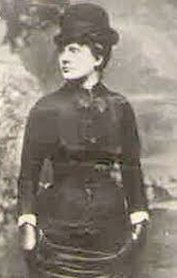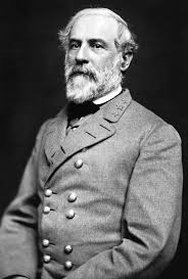A Sample of Sherwood
"Like Unto Like", Holly Springs, Mississippi, Robert E. Lee, Sherwood Bonner, The Lost Cause


Sherwood Bonner 1849-1883 (left) — Lee (right).
Our new house in Northern Mississippi had previously been the home of a fairly distinguished female regional author, Sherwood Bonner, who had also been secretary, friend, and muse to the very famous poet Henry Wadsworth Longfellow.
Sherwood Bonner wrote mostly (now unpopular) dialect stories, and essays and sketches for periodicals like Harper’s and Lippincott’s. She left only one novel, Like Unto Like, whose plot superficially resembles Miss Ravenel’s Conversion: patriotic Southern belle, in aftermath of defeat, falls in love with Yankee.
I’ve just started Like Unto Like, and I find Sherwood Bonner a pretty good read. Her descriptions of her Southern town are perceptive and interesting and I like her active and observant outlook.
At the point I reached late last night, it is summer, a year or so after the war, Yankee troops are being transferred from New Orleans to “Yariba” in northern Mississippi (Holly Springs, fictionalized) to escape the summer heat. The Tollivers are in bad odor with local Society, having been forced by financial stress to accept a Yankee officer, Colonel Dexter, and his family as boarders. Our heroine, Blythe Herndon (recognizable as Sherwood Bonner’s fictional alter ego) is destined to fall in love with Roger Ellis, a Northern friend visiting the Dexters.
The tension in town is alleviated when old Mrs. Oglethorpe (the acknowledged head of Yariba society) makes a point of calling upon (and thereby accepting the society of) Mrs. Dexter. Mrs. Oglethorpe has decided that it is her Christian duty to promote reconciliation.
Mrs. Oglethorpe’s gesture provokes a conversation between Blythe and the Tolliver family. Blythe explains her family has put off calling on Mrs. Dexter due to her grandmother’s irredentist attitudes. She lost a son, William, and the South’s defeat caused the old woman to break down emotionally, lose interest in everything, nearly to lose her mind. She paced the halls at night, walking in her sleep, “as white as a ghost.” A year later, she has only slightly improved.
Poor soul!” said Mrs. Tolliver. “If William had been spared she wouldn’t have felt so. I’m sure I don’t think I could have had them in in my house if Van had been killed.”
“I don’t think Uncle Will’s death made any special difference; I think it’s the ‘Lost Cause’ grandma mourns. I can’t understand it. I think it is a great deal better to forgive and forget; don’t you, Van?”
“I don’t want to forget,” said Van throwing back his head with a spirited action peculiar to him. “We made a good fight for our rights, and I’m glad and proud to have been in it. But as for bearing any malice against the men that whipped us –not I. The war ended. I would just as soon have shaken hands with General Sherman as with Joe Johnston.”
“Or with Grant as with Robert E. Lee?”
“No,” said the young man, with a sudden reverence in his tone, “for I would have knelt to Lee.”



